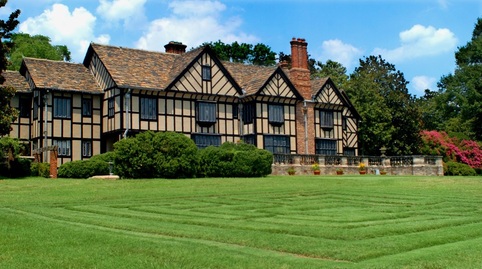<Back to Culture
"What Fools These Mortals Be!"

By Micah Farmer
Two of Shakespeare's beloved plays will be featured at this summer's Richmond Shakespeare Festival. The festival will kick off with a Gilded Age version of A Midsummer Night's Dream from Thursday June 12th through Sunday, July 6th, followed by a run of a traditional English Renaissance performance of Richard III at Richmond's Agecroft Hall from Thursday July 12th through Sunday August 3rd. Performances will begin each night at 8pm at the outdoor theater.
A Midsummer Night's Dream follows a tangled web of four lovestruck mortals, a band of six amateur actors, and the mischief that befall them when fairies interfere. “I wanted to surrender to the quintessential fairy tale for our society,” says Dr. Jan Powell, the artistic director at both Henley Street Theatre and Richmond Shakespeare--the two theatre companies joined forces in March this year--and the director for Midsummer. “When we think of fairies, we think of Grimm’s Fairy Tales, or we think of the Wizard of Oz, turn of the 20th century, Gilded Age, art nouveau fairies. I just wanted to give in to that feeling, to that kind of magic.”
According to Powell, the fairies in her version of Midsummer are not sweet and cute, but instead are impish, easily distracted, and emotionally volatile creatures that revel in creating mischief for the mortals traveling through the forest inhabited by the fairies. Raven Wilkes, a student at VCU, will be taking on the role as Puck for this summer's festival. “Raven is every bit the trickster,” Powell says. “She has this incredibly bright light, naughty energy, so I'm going with that.” John Moon will play both mortal King Theseus and the fairy king, Oberon, whose jealousy over his wife, Queen Titania (played by Melissa Johnston Price), sets the chaos that unfolds into motion. “Oberon, in this production, takes an arc from a really more of an immature guy,” she explains. “He is more of a playful teenager who matures through having decided to play this trick on his eternal beloved, the Fairy Queen, and sees that it was not a kind things to do, so he learns his lesson.” The lessons that Oberon learns in the fairy world carry over to his life as Theseus in the mortal world, resulting in a happy ending for all the characters.
Richard III will be directed by James Alexander Bond, a New York City director, who has directed over a dozen shows with Richmond Shakespeare. Although Bond has directed two-thirds of Shakespeare's thirty-seven plays, this summer's festival will be his first time directing Richard III. Richard III is the conclusion of Shakespeare's tetralogy (an ongoing plot told through a series of eight plays beginning with Richard II) that follows the Machiavellian rise to power of King Richard III of England. “One of the difficulties with Richard III is there are certain characters in Shakespeare's canon that people tend to write off as evil,” Bond says. “The more you take them as basic guys who have problems that land them there, the more interesting your play gets. The trick with Richard III is finding what it is that drives him to do the things that he does.” In Bond's vision of the character, Richard III is the younger brother of the newly ascended King Edward IV, ostracized by society due to his physical deformities. Despite the peace that England has finally achieved at the end of the Hundred Year's War, Richard strives to return to the battlefield where he was accepted. His anger and humiliation at being pushed aside builds until he decides to prove his power by murdering everyone standing between himself and the throne.
Two of Shakespeare's beloved plays will be featured at this summer's Richmond Shakespeare Festival. The festival will kick off with a Gilded Age version of A Midsummer Night's Dream from Thursday June 12th through Sunday, July 6th, followed by a run of a traditional English Renaissance performance of Richard III at Richmond's Agecroft Hall from Thursday July 12th through Sunday August 3rd. Performances will begin each night at 8pm at the outdoor theater.
A Midsummer Night's Dream follows a tangled web of four lovestruck mortals, a band of six amateur actors, and the mischief that befall them when fairies interfere. “I wanted to surrender to the quintessential fairy tale for our society,” says Dr. Jan Powell, the artistic director at both Henley Street Theatre and Richmond Shakespeare--the two theatre companies joined forces in March this year--and the director for Midsummer. “When we think of fairies, we think of Grimm’s Fairy Tales, or we think of the Wizard of Oz, turn of the 20th century, Gilded Age, art nouveau fairies. I just wanted to give in to that feeling, to that kind of magic.”
According to Powell, the fairies in her version of Midsummer are not sweet and cute, but instead are impish, easily distracted, and emotionally volatile creatures that revel in creating mischief for the mortals traveling through the forest inhabited by the fairies. Raven Wilkes, a student at VCU, will be taking on the role as Puck for this summer's festival. “Raven is every bit the trickster,” Powell says. “She has this incredibly bright light, naughty energy, so I'm going with that.” John Moon will play both mortal King Theseus and the fairy king, Oberon, whose jealousy over his wife, Queen Titania (played by Melissa Johnston Price), sets the chaos that unfolds into motion. “Oberon, in this production, takes an arc from a really more of an immature guy,” she explains. “He is more of a playful teenager who matures through having decided to play this trick on his eternal beloved, the Fairy Queen, and sees that it was not a kind things to do, so he learns his lesson.” The lessons that Oberon learns in the fairy world carry over to his life as Theseus in the mortal world, resulting in a happy ending for all the characters.
Richard III will be directed by James Alexander Bond, a New York City director, who has directed over a dozen shows with Richmond Shakespeare. Although Bond has directed two-thirds of Shakespeare's thirty-seven plays, this summer's festival will be his first time directing Richard III. Richard III is the conclusion of Shakespeare's tetralogy (an ongoing plot told through a series of eight plays beginning with Richard II) that follows the Machiavellian rise to power of King Richard III of England. “One of the difficulties with Richard III is there are certain characters in Shakespeare's canon that people tend to write off as evil,” Bond says. “The more you take them as basic guys who have problems that land them there, the more interesting your play gets. The trick with Richard III is finding what it is that drives him to do the things that he does.” In Bond's vision of the character, Richard III is the younger brother of the newly ascended King Edward IV, ostracized by society due to his physical deformities. Despite the peace that England has finally achieved at the end of the Hundred Year's War, Richard strives to return to the battlefield where he was accepted. His anger and humiliation at being pushed aside builds until he decides to prove his power by murdering everyone standing between himself and the throne.

“My previous shows at Agecroft, three of them, have been Henrys who are such golden boys and heroes, and finding what an audience can connect to and love in them, that's not a problem. Everyone wants to be Henry V,” Bond explains his reasoning behind his depiction of Richard III. “Nobody wants to acknowledge that they have pieces of Richard III in them, but we all do. We all have those thoughts that we don't act upon. So what can I do with Richard III that makes us appreciate and want to go on that journey with him until that moment when we realize, 'This is a terrible journey! Why did I get on this ride?' That's the biggest challenge with Richard.”
Because Richard III is the conclusion of a continuing story, in order to clarify plot details and character relationships, Bond has stripped everything that isn't crucial to understanding the play. “In some places that's been very difficult because there are moments that I truly, truly love,” Bond says. “There's no sitting there wondering if you missed something because the truth is you got that information three plays ago. This Richard III should be able to stand by itself beautifully, which is the most important thing for me.”
The Richmond Shakespeare Festival will take place at Richmond's Historic Agecroft Hall, an authentic English Tudor manor house build over 500 years ago before it was moved and rebuilt in Richmond. “It's a unique place for doing Shakespeare,” Powell says. “Shakespeare's own company, if they didn't perform at this house in England, performed at every house in the neighborhood. The knowledge that my troupe is performing with their voices resonating against the very timbers that Shakespeare's own company probably did absolutely thrills me.”
“It's a completely different style of direction, a different style of acting,” Bond says. “That's what I like about it, the use of this skill set that almost never gets used everywhere else you work. You almost get to wipe the dust off of it and use it here. It feels so much more grand, yet interestingly more intimate, and the connection between audience and actor is so much more intense.”
Audience members are invited to arrive early to stroll through the manor gardens and enjoy a picnic dinner on the lawn as the Festival Young Company actors serenade patrons with songs and monologues. Visit the Henley Street Theatre website to purchase tickets for the performances.
Because Richard III is the conclusion of a continuing story, in order to clarify plot details and character relationships, Bond has stripped everything that isn't crucial to understanding the play. “In some places that's been very difficult because there are moments that I truly, truly love,” Bond says. “There's no sitting there wondering if you missed something because the truth is you got that information three plays ago. This Richard III should be able to stand by itself beautifully, which is the most important thing for me.”
The Richmond Shakespeare Festival will take place at Richmond's Historic Agecroft Hall, an authentic English Tudor manor house build over 500 years ago before it was moved and rebuilt in Richmond. “It's a unique place for doing Shakespeare,” Powell says. “Shakespeare's own company, if they didn't perform at this house in England, performed at every house in the neighborhood. The knowledge that my troupe is performing with their voices resonating against the very timbers that Shakespeare's own company probably did absolutely thrills me.”
“It's a completely different style of direction, a different style of acting,” Bond says. “That's what I like about it, the use of this skill set that almost never gets used everywhere else you work. You almost get to wipe the dust off of it and use it here. It feels so much more grand, yet interestingly more intimate, and the connection between audience and actor is so much more intense.”
Audience members are invited to arrive early to stroll through the manor gardens and enjoy a picnic dinner on the lawn as the Festival Young Company actors serenade patrons with songs and monologues. Visit the Henley Street Theatre website to purchase tickets for the performances.
: Tweet
:

